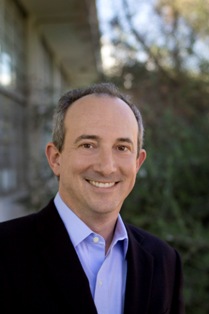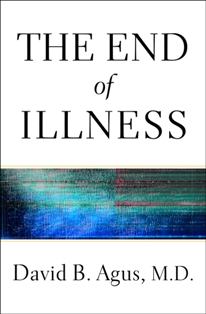Jan 25, 2012
 | |
| David B. Agus, MD | Photo credit: Todd Hido |
The book, which is geared primarily toward the general public, calls for people to rethink their approach to health, including working with physicians to develop their own personalized health metrics based on extensive testing, including genetic profiling and proteomics. Other key points in the book include advice to avoid vitamins and sources of inflammation. He also argues in support of the prophylactic use of aspirin and statins.
Dr. Agus is professor of medicine and engineering at the University of Southern California (USC) Keck School of Medicine and the Viterbi School of Engineering and is head of USC’s Westside Cancer Center and the Center for Applied Molecular Medicine. He is Chair of the Global Agenda Council on Genetics for the World Economic Forum and is co-founder of Applied Proteomics and Navigenics, two health-care technology and wellness companies. He describes himself as a staunch advocate for personalized medicine, and in support of his views, has posted his own genetic profile in his book and on his website.
Dr. Agus’s honors and awards include the American Cancer Society Physician Research Award, a Clinical Scholar Award from the Sloan-Kettering Institute, and the 2009 GQ magazine Rock Star of Science Award. He is a longtime ASCO member and a past member of the Information Technology Committee and the Cancer Education Committee’s Subcommittees on Practice Management and Information Technology, and Annual Meeting and Disease-Specific Small Meetings.
“I owe so much to ASCO,” Dr. Agus recently said during an exclusive interview with ASCO Connection. “ASCO gave me my start.”
 |
AC: What inspired you to write this book?
Dr. Agus: I’m a cancer doctor like the rest of the membership of ASCO, and a couple of times a week, I look in someone’s face and say, “I’m out of new drugs. Unfortunately, there’s nothing I can do; unfortunately, the disease is going to win.” So part of what this book is about is this notion that we’re not great at treating advanced cancer. We’re certainly getting better, but what we can do is prevent most cancers. So this is a strategy about thinking on the prevention side. It’s where the National Cancer Institute has funded me over the last couple of years, which is as an engineer. So it’s a physical-science concept. It’s thinking of cancer as a complex system within the body rather than a mutation in EGFR, if you will. And that’s the basic premise of the book.
My understanding is that cancer is a verb, not a noun. You are cancering. What we want to do is go from a cancering state to a health state. I’m as guilty as anyone else, but we keep treating the disease to shrink it, when we need to change the state of the body. That’s what I learned from the physics and engineering community; we have to think differently in that regard. We have to develop drugs differently and trials differently.
AC: Do you think any of the prevention recommendations will be controversial [e.g., avoiding vitamins, taking aspirin and statins, genetic profiling]?
Dr. Agus: To me, controversial is a good thing, and these issues are already controversial. On Nightline, the anchor, Bill Weir, came out to see me and we sequenced his DNA and looked at his proteome [the set of expressed proteins in a given type of cells at a given time]. From his DNA sequence, he had the polymorphism that said he was at higher risk for heart disease. So based on that, I gave him a heart scan at age 44—he was healthy, skinny, exercised every day—and we found significant atherosclerotic disease, a big lesion in his LAD, the big artery in his heart.
In a sense, we positively affected his health, hopefully, through new preventive strategies and behavior modification. People criticize that. They say the algorithm says he shouldn’t have been screened. The argument is the algorithm is wrong. The system would have failed him.
If you look at the data on things like statins and aspirin, their effect on preventing cancer are profound. We’re not educating people to use them in that sense as much as we should.
Regarding vitamins, when the government does a $135+ million study (the Selenium and Vitamin E Cancer Prevention Trial) showing that taking vitamin E for three years increases your risk of prostate cancer pretty dramatically—17%—what are we doing?
This is not the century of biology as it’s called; it’s the century of the convergence of the scientists. I want the biologists, the physicists, the mathematicians, the clinicians all to work together because that’s how we’ll get answers.—David B. Agus, MD |
AC: When you use the term “personalized medicine,” how do you define that for oncology professionals?
Dr. Agus: Classically, we’ve defined that as the tumor. Has ALK mutated or has it not? Has EGFR mutated or has it not? I’m looking more on the broader scale at us as individuals. Certainly we can use it on our metabolism genes. We can also start to look at our risk profile and look at why we’re cancering. What are our metrics for health as an individual? On the treatment side, we’re reasonable but we’ve got to get better.
In 1923, the renowned geneticist J. B. S. Haldane articulated that we’re going to screw up with cancer and heart disease because we’re going to treat them as an infectious disease. Once you make the diagnosis, you have to treat it. Infectious disease is from without; cancer is from within. It’s the interactions of the tumor AND your body. Current personalized medicine can only measure the tumor and your body separately. We’re not putting them together. But we will and that’s going to be the next generation of personalized medicine—modeling the system for the individual.
AC: Can you discuss your work with proteomics?
Dr. Agus: In 1976, if you thought you were pregnant, you’d go to the hospital, they would take a tube of blood and inject it into a rabbit and take the ovaries out of the rabbit; if they were enlarged, you were pregnant. And that was the state of the art. In 1977, Warner Chilcott came out with a proteomic-based test [Early Pregnancy Test].
Now in proteomics, we can look at all the proteins in the blood. It really is the first way we can look at the whole system. Instead of just saying what is the genetic status of the cancer, we can actually look at the whole system. So the technology is good today but it’s only going to get better.
How many drugs at ASCO Annual Meetings have randomized trials that show a survival advantage yet no objective responses because they slow the growth of the cancer? That’s a problem I see every day—a patient comes in and their cancer is two centimeters; they come back three months later and it’s three centimeters. Did the drug work or not? Would it have been 10 centimeters without the drug? With proteomics, you have the potential of actually measuring the state of system and giving me the answer, so knowing in real time how I can deal with the patient.
The way a remarkable engineer once explained it to me—if you’re in front of two Chinese restaurants, and you look at the ingredient list, they’re exactly the same. If you taste the food, they’re very different. So genomics is that ingredient list. Whereas proteomics is tasting the food. And knowing what happens at that moment in time.
This is a new technology in development but I think it’s going to be very powerful in the near future.
AC: How can clinical oncologists prepare for the genomic era?
Dr. Agus: I think we have to take a step back as clinical oncologists and realize that our job is not necessarily to understand the cancer but to control the cancer. For each individual patient we need to ask, what’s our goal? To live longer? To help them live better? To slow the growth of the cancer? Is it to shrink it? Then how are we going to measure that? What’s our metric going to be? As oncologists we have to get more in tune with metrics and the value system of the individual patient. Not the old metrics, which right now are predominantly just the CT scan and bi-dimensional measurements.
AC: If the goal isn’t to understand cancer, what do you think researchers should be focused on?
Dr. Agus: I think sometimes we get so deep in the forest that we forget to take that step back and look at all of it. The human body is giving us clues every day. As oncologists, we get to watch molecular evolution in process—cancer evolves. We get clues staring at us: for example, why do most cancers metastasize to the mid-skeletal, but they don’t go to the distal feet?
There are answers there. The clinical oncologist’s observations are some of the greatest tools in the research of cancer. Put the two together—these observations and biology—and you’ve got a much, much more powerful tool. I’m pushing for intersections in the field. This is not the century of biology as it’s called; it’s the century of the convergence of the scientists. I want the biologists, the physicists, the mathematicians, the clinicians all to work together because that’s how we’ll get answers.
AC: When do you envision that personalized genetic monitoring will become commonplace?
Dr. Agus: We’re at the exponential growth curve in applying technology to disease. I don’t think we have a choice but to use it. We’re the number one spender in health care in the world yet we’re ranked #32 in health. The way we get better is to lower cost through technology. It’s not going to raise costs; it’s actually going to lower costs because it’s going to do the right thing for the right person. It has to happen soon.
AC: Though the book is geared primarily to the general public, what’s the take-away message for oncology professionals?
Dr. Agus: Think of the whole system. Think of cancer in the body as a complex system. It really does change how we think of the disease.
AC: What are biggest challenges facing the oncology profession?
Dr. Agus: It’s utilization of resources. We have lots of good drugs, but how do you use them, where do you use them, when do you use them, and when do you know if they’re working or not? I think we have in our armamentarium many of the drugs we need to really keep this disease (or diseases depending on how you look at things) under control and to prevent future disease. At the same time, we’re missing the tools to know how to use these drugs effectively.
AC: What are you focusing on professionally over the next few years?
Dr. Agus: I’m going to continue treating patients with disease and studying the disease. I co-lead one of the National Cancer Institute’s Physical Sciences–Oncology Centers [at USC], and it’s my passion. I really believe that the merging of the physics, the math, the engineering, together with the biology is going to make a difference. So that’s where I’m putting my efforts and proteomics is a tool to monitor the state of the system, but I’m not giving up caring for patients every day. It’s an honor, and it’s what allows me to really understand what I’m doing.
